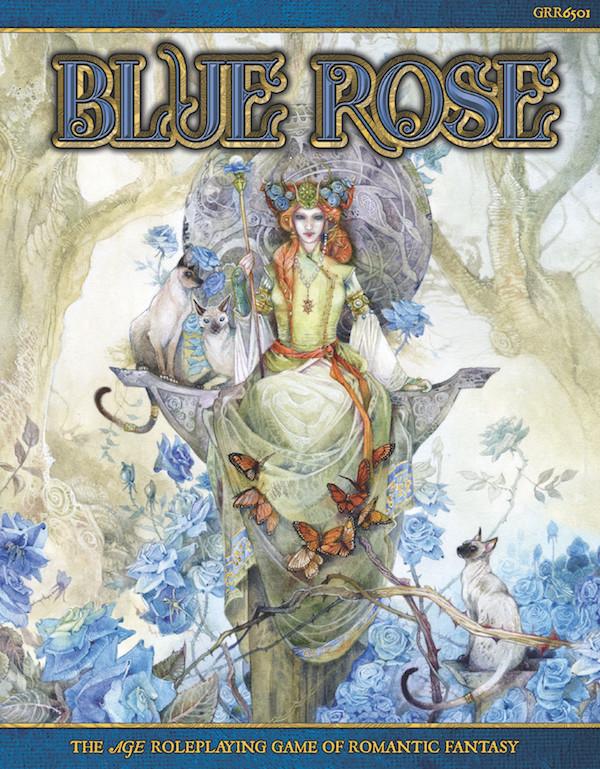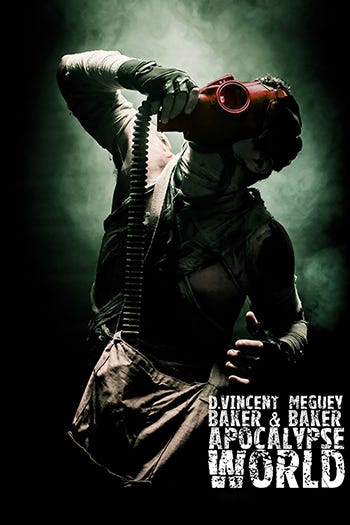Trending
Opinion: How will Project 2025 impact game developers?
The Heritage Foundation's manifesto for the possible next administration could do great harm to many, including large portions of the game development community.
An examination of two tabletop RPGs (Green Ronin's Blue Rose and the 2nd edition of Apocalypse World) that stand out for emphasizing the theme of relationship-building and making it central to gameplay.

While speaking on a couple of panels at GenCon this month, I had occasion to discuss what I loved most about tabletop RPGs: their collective nature. The character you play, after all, is shaped by interactions with others, never in insolation.
Roleplaying is a relational subject which, except in extremely rare circumstances, only gains meaning in a social context. Your character, however lovingly crafted, is incomplete until she is tested in relationships with the other people at the gaming table. How she responds to conflicts and challenges both define and shape her; more than once, you'll find your character starts coloring outside the lines of your intentions. Your actions are also often constrained by your fellows; collaboration and conflict are inevitable. Even NPCs play their role in shaping your character. In the hands of a skilled DM/GM, they provide the same frisson that forges a personality.
To roleplay, then, is to build relationships.
All roleplaying games to some extent or other do this, but there's a few that stand out for emphasizing that theme and making it central.
Green Ronin's Blue Rose is a venerable game at this point, albeit extensively revised and re-released in recent years, whose promises of "romantic fantasy" are fulfilled through roleplay that emphasizes your characters' relationships. The core rulebook gives an expansive definition of "romantic fantasy" that ties more to the wider philosophical idea of romance, of passion, feeling, and connection put front and center.

"The developers of Blue Rose suggest that 'romantic fantasy' is different from Tolkienesque fantasy in that there's a greater emphasis on a person's role as part of a larger collective."
Listing a variety of fantasy writers as inspiration--like Tamora Pierce and Mercedes Lackey--the developers of Blue Rose suggest that "romantic fantasy" is different from Tolkienesque fantasy in that there's a greater emphasis on a person's more modest but still-noteworthy role as part of a larger collective. As opposed to a small fellowship that exalts individual heroism, you play a part in a larger network of intrigue and social adventure, defending a faction, school, nation, or some other supra-personal organization. As the devs put it, "members of some prominent group or official organization that goes on exciting adventures to protect ordinary people from danger."
It's obvious that this isn't so different from classic fantasy, but the distinction is one of accents and emphases. Blue Rose has a few pages devoted to "optional" rules to structure Relationships with a capital-R, for instance, going well beyond classical D&D style roleplay to provide productive structure for connections between characters (whether PCs or NPCs). The first major mechanic is the Bond, a defined relationship between your character and another (i.e. "I love them more than my own life"). Interestingly, this can exist between a person and a group or organization, as well. Either way, it provides a roleplaying tentpole that focuses the RP of the relationship. The second is Intensity, a score from one to five that denotes the depth of feeling a character has for another.

Blue Rose Narrator's Kit
"For each rank of Intensity," says the rulebook, "a character gets a free stunt point they can spend on actions related to their Relationship once per game session." In other words, they can buy a new ability in a pinch, if it's related to the object of their love, duty, or loathing.
As to romance of the more intimate variety, Blue Rose provides broad RP guidelines for how to conduct such matters ethically, but strays away from encoding rules into the affair. "Rolling dice to see if a kiss hits is a sure way to spoil the mood," the sourcebook says. Or as I put it at GenCon, before an 18+ audience, "one does not say ‘okay, your panties are off, now roll for initiative.'" Still, other games provide thought provoking examples of how to do this sort of thing well.
***
Foregrounding relationships in game rules is something of an art, an arguably more delicate one than most other areas of game design because so much unpredictable emotion enters into the equation.
There's a lot to learn about that fragile art from D. Vincent Baker and Meguey Baker's influential Apocalypse World system--now in its second edition. Its attempts at mechanizing the player relationship are particularly successful, I'd argue.

I certainly mean no insult to this proudly punkish game by saying it "mechanized" social interaction, but it's a useful way of describing what a game has to do in order to bring relationships to the fore: there must be a measure of structure, some rules and guidance that both incentivize and reward players for thinking consciously about this sort of thing, which can encourage more meaningful play, especially in less "crunchy" systems.
Everything flows from this ethos, expressed at the beginning of its new rulebook, under the "Why to Play" section:
One: Because the characters are fucking hot.
Two: Because as hot as they are, the characters are best and hottest when you put them together. Lovers, rivals, friends, enemies, blood and sex--that's the good shit.
I can hardly better D. Vincent and Meguey Baker's choice of words there.
Apocalypse World does something interesting with relationships in its second edition, streamlining its "Hx" system, which is a prescription-style abbreviation for "History," defining relationships between characters at the table (this is similar to Blue Rose's bonds but with more immediate mechanical effects). This statistic is shaped by relationship themes from each class, where each player establishes some relationship with another player, like "Which one of you do I figure is doomed to self-destruction?" for the healing Angel or "Which one of you have I been watching carefully, in secret?" for the mystical Brainer, provides a bonus or a penalty to rolls taken to help or hinder another player's actions.
This is an improvement over the first edition as this process is now entirely controlled by an individual player, instead of having other players tell you what values of Hx to mark on your sheet. The collaborative aspect remains: you ask these questions of your fellow players, and someone volunteers to be, say, the "one who has betrayed or stolen from me," without wasting time debating a value for the stat.
Equally interesting is the "Special Move" that's given pride of place in each class playbook. They're sex moves. Each comprises either a special event that occurs when your character has sex, or a unique move you can make that has certain outcomes requiring mediation by the MC (the Apocalypse World GM). This not only encourages relationships but provides interesting mechanical effects for intimacy.
"The game's Special Move mechanic is enticingly leaky, and a lovely reminder that 'intimacy' has fluid boundaries that spill well beyond sex as traditionally understood."
There are interesting extensions of this mechanic as well. The Maestro'D, a figure who owns a bar, club, or some other establishment of similar vintage, has a unique special that treats any instance of the Maestro'D "hooking another character up with sex, with food, with somethin somethin, whatever" as sex for the purposes of game mechanics. This means when a Maestro'D provides, say, a unique car part for a Savvyhead, it'll trigger the latter's Special Move, with all the consequences that flow on from that. In this case, the Savvyhead's Special Move allows them to gain deep insight into their sex partner using a skill normally reserved for technical objects, letting them ask questions like "What strong emotions have been most recently nearby this [person]?" In other words, for a Maestro'D to "hook up" a Savvyhead, she has to effectively engage in a profound act of trust.
This is enticingly leaky, and a lovely reminder that "intimacy" has fluid boundaries that spill well beyond sex as traditionally understood.
At any rate, this takes number crunching far beyond the traditional realm of combat--which Apocalypse World does very well, of course, but it's notable for how much attention it gives to relationships between the players. It takes the generativity that's naturally there and pushes it to another level, formalizing it with unique rules that encourage still more creative play.
How might one do this sort of thing in a videogame, I wonder? It's more challenging there, of course. The crucial problem bedeviling all such games is that they lack the sheer humanity of a living, breathing dungeonmaster to adjudicate on everything. A videogame RPG must, by necessity, automate the DM/GM role and thus bleed it dry of the passions that enter into relationship mechanics. But as systems get smarter, we may be closer than ever to capturing this sort of thing in a videogame.
Imagine bonuses given to attacks or rolls taken by two players who have a longstanding history of gaming together. How might that work at the level of a party? Or even a guild? How might we reward players in meaningful in-game ways for gaming well together? All questions worth pursuing, in my view, as gaming drifts ever further into the Always-Online ocean.
Why bother? Well, as the Bakers might say, "characters are fucking hot."
Katherine Cross is a Ph.D student in sociology who researches anti-social behavior online, and a gaming critic whose work has appeared in numerous publications.
Read more about:
2017You May Also Like